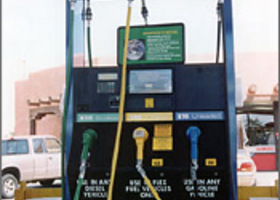Alternative fuels are derived from sources other than petroleum. Most are produced domestically, reducing our dependence on imported oil, and some are derived from renewable sources. Often, they produce less pollution than gasoline or diesel.
Alternative fuels are any fuel sources that are not derived from fossil fuels such as coal, oil, and natural gas. They are typically more sustainable and produce fewer emissions than traditional fuels. Here are some of the most common types of alternative fuels:
1.Biofuels: These are fuels made from organic matter such as plants, agricultural waste, and animal fats. There are two main types of biofuels: ethanol and biodiesel. Ethanol is made from crops such as corn, sugarcane, and switchgrass, while biodiesel is made from vegetable oils, animal fats, and recycled cooking oil. Biofuels are primarily used in the transportation industry as a substitute for gasoline or diesel fuel.
2.Hydrogen: Hydrogen is a clean-burning fuel that can be produced from a variety of sources, including natural gas, coal, and water. When hydrogen is burned, it produces water vapor and no harmful emissions. Hydrogen can be used in fuel cells to power vehicles and as a source of energy for electricity generation.
3.Natural Gas: Natural gas is a fossil fuel, but it is considered an alternative fuel because it is cleaner-burning than oil or coal. Natural gas can be used to power vehicles, heat buildings, and generate electricity. Compressed natural gas (CNG) and liquefied natural gas (LNG) are two common forms of natural gas that are used as transportation fuels.
4’Electric Power: Electric power is a form of energy that can be generated from a variety of sources, including wind, solar, and hydroelectric power. Electric vehicles (EVs) use batteries to store electricity and power an electric motor to move the vehicle. Electric power is also used in many other industries, including manufacturing, construction, and transportation.
5.Propane: Propane is a byproduct of natural gas processing and crude oil refining. It is used as a fuel for heating homes and businesses, cooking, and powering vehicles. Propane is also used as a fuel for forklifts and other equipment in manufacturing and warehouse operations.
The Federal Highway Administration (FHWA) recently announced the designation of the nations first alternative fuel corridors for electric, hydrogen, natural gas, and propane vehicles. With this designation, FHWA is facilitating the creation and expansion of a national network of alternative fueling and charging infrastructure along national highway system corridors. This is the next step in advancing America’s 21st century transportation network. For more information on these corridors, including maps and additional resources, please visit the FHWA website at:
http://www.fhwa.dot.gov/environment/alternative_fuel_corridors.
Industries that are likely to use alternative fuels include the transportation industry (including cars, trucks, buses, and trains), the power generation industry (including electricity generation and heating), and the manufacturing industry (including construction equipment and forklifts). Additionally, alternative fuels are being increasingly used in the aviation and marine industries as well.




